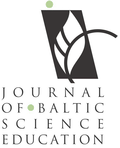STUDENTS’ SELF-REGULATION AND TEACHERS’ REGULATING APPROACHES IN SCIENCE: RESULTS FROM A NORWEGIAN STUDY
| Title | STUDENTS’ SELF-REGULATION AND TEACHERS’ REGULATING APPROACHES IN SCIENCE: RESULTS FROM A NORWEGIAN STUDY |
| Publication Type | Journal Article |
| Year of Publication | 2009 |
| Authors | Elstad, E, Turmo, A |
| Journal | Journal of Baltic Science Education |
| Volume | 8 |
| Issue | 1 |
| Start Page | 35-43 |
| Date Published | March/2009 |
| Type of Article | Original article |
| ISSN | 1648-3898 |
| Other Numbers | ICID: 885089 |
| Keywords | self-regulated learning, teacher regulating approaches |
| Abstract | In Norway, the curriculum reform known as ‘Knowledge Promotion’ emphasizes that teachers should have high ambitions for their students and provide more so-called ‘learning pressure’ (or academic pressure) in the classroom. This school reform initiated in 2006 puts particular focus on schools’ responsibilities for fostering strategies that benefit student learning. This paper reports an empirical study of Norwegian high school students’ motivation, learning strategy use and self-regulation in science. It focuses on how students respond to teachers’ regulating approaches. The results show that in science classes the goal of teacher mastery seems to have a more positive effect on boys, while girls respond more positively to teachers’ academic pressure. Furthermore, ethnic majority students respond more positively to the mastery approach, while the academic pressure approach seems to be more important for ethnic minority students in the science classroom. In conclusion, we argue against the assumption in theoretical literature that academic pressure gives a somewhat one-sided negative effect. This assumption about academic pressure needs to be more nuanced. |
| URL | http://oaji.net/articles/2014/987-1404720566.pdf |
| Refereed Designation | Refereed |
| Full Text |
